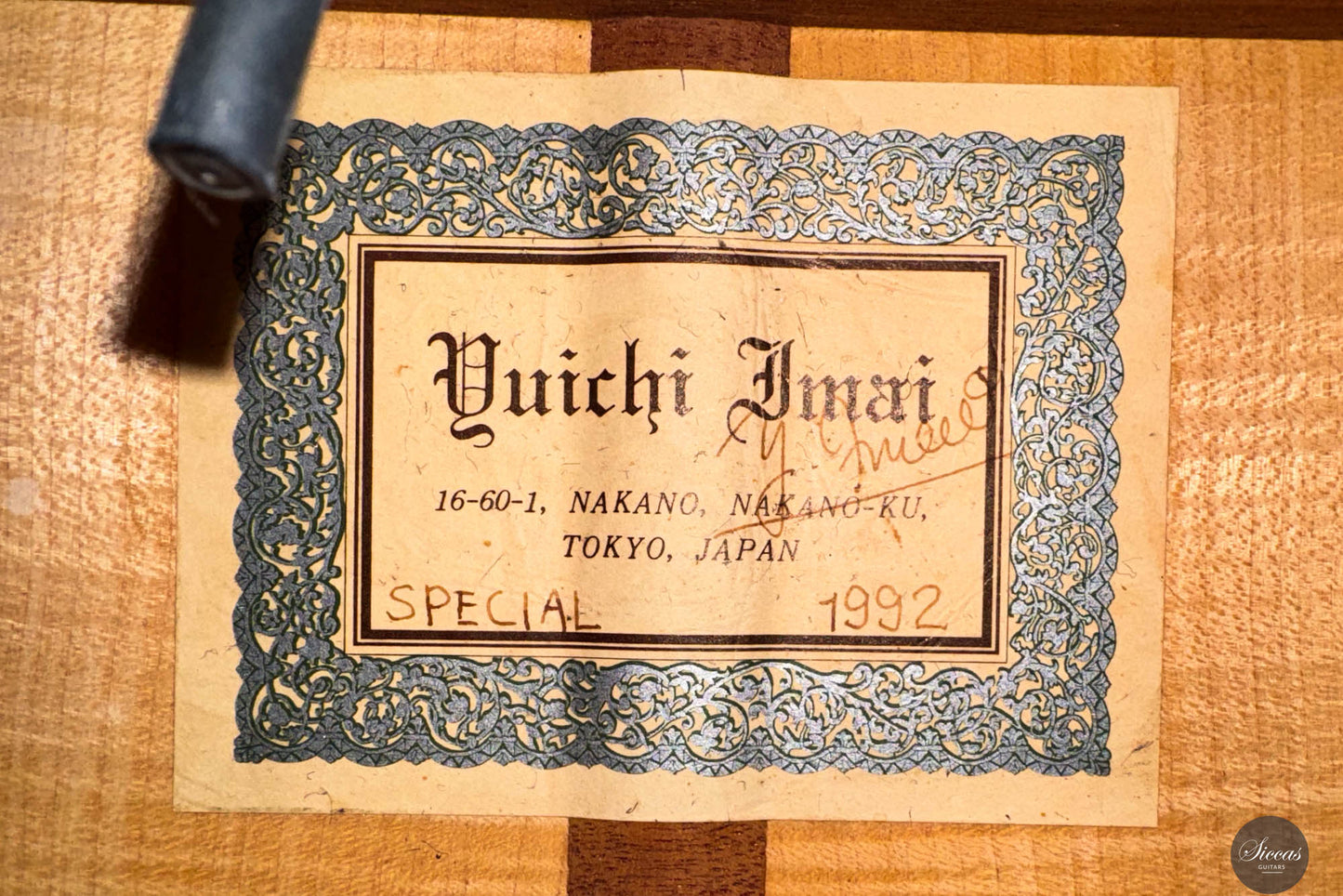Yuichi Imai - 1992 -Special
Yuichi Imai - 1992 -Special
Details
Details
Overview
Overview
Shipping important note
Shipping important note
Delivery times are typically reliable and most instruments arrive within the estimated timeframe.
Should any unexpected delay occur, our team will keep you informed and provide support at every step. For all shipping details and exceptions, please see our Shipping Policy.
Details about GPSR
Details about GPSR























Video overview



More details about the guitar
About the luthier
Yuichi Imai is one of the most reputable guitar makers from Japan. He was born in Tokyo in 1949. At age eighteen, he started his apprenticeship with Akira Nakade and studied with him for three years before opening his own workshop in 1971. Today, he is considered one of the best luthiers in Japan and enjoys an outstanding international reputation. Yuichi Imai’s guitars are not so easy to find outside Japan due to the high demand in the local market. Several world-class players have played Imai guitars, including Aniello Desiderio, Frank Bungarten, Roman Viazovskiy, and Alvaro Pierri.About the guitar
This stunning 1992 Yuichi Imai guitar is a fine example of craftsmanship from one of Japan’s most esteemed luthiers. Highly regarded in Europe and played by some of the finest guitarists, Yuichi Imai’s instruments are known for their exceptional quality and musicality. This particular guitar stands out as a rare find, featuring beautifully crafted maple back and sides. Tonally, it echoes the tradition of the Madrid school of guitar making, offering a powerful yet warm and lyrical sound. As a pre-loved instrument, it remains in excellent condition, with only minor signs of playing wear. A true joy to play, this guitar offers effortless responsiveness, making it easy to bring out every nuance and voice. This is a rare opportunity to own a high level guitar at a highly attractive price. Moreover, this instrument has electronic system which making it even more suitable for all playing conditions.Regular care extends the life of the instrument
Even with careful use, a classical guitar may gradually change in appearance or respond to unstable storage conditions. Have a close look at your guitar regularly and be attentif to changes. If your instrument is suffering from its environement, it will let you know.
Protect Your Guitar: Handle with Care
Be mindful when touching your instrument with greasy or unwashed hands: any skin contact is a small attack on the varnish. Of course, a guitar is made to be played, but taking a few precautions helps preserve its beauty: wash your hands before playing, wear long sleeves, and avoid unnecessary direct skin contact with the body of the instrument.
Pro tip: Avoid playing with a button-up shirt, heavy jewelry, or a belt, as these can scratch the guitar. Also, make sure your guitar case is free of any objects that could damage the instrument during storage.
String care
A good habit to adopt is wiping down your strings briefly after each playing session. This small action significantly extends their lifespan and helps maintain a consistent, comfortable feel under your fingers.
Most importantly, clean strings are essential for keeping your instrument in tune. Corrosion, sweat, and dust can affect the uniformity of the strings and interfere with accurate tuning across the entire fingerboard.
Pro tip: If you're having trouble getting your guitar in tune, it might be time to change the strings. A useful test is to compare the pitch of the 12th fret harmonic with the fretted note at the 12th fret; if there's an unusually large gap between them, your strings may have lost their integrity and should be replaced.
Keep Your Shellac Finish Shining!
Got a guitar with a shellac (French polish) finish? Here's a simple trick: Take a clean microfiber cloth and gently breathe on the surface to create a light mist. Then, softly rub to remove fingerprints, sweat, and grease. That’s usually all it takes to keep it looking great, no products needed!
Pro tip: Every few years, treat your guitar to a check-up with a luthier to keep it in top shape.
Storing Your Guitar: Climate Matters
Your guitar can safely stay outside its case, as long as the surrounding environment maintains 42–55% humidity and a temperature between 18–25°C.
Keep in mind that humidity levels can still fluctuate inside the case, especially during seasonal changes.
- Too much humidity may cause overtightened strings and a dull tone.
- Too little humidity can lead to a bulging top, string buzz, or even cracks.
Avoid placing your guitar near radiators, air conditioners, or windows with direct sunlight.
Pro tip: Always close your guitar case while playing. This helps preserve a stable microclimate inside the case, so your instrument is protected the moment you put it back in.


















































